Wildfarmed: Rewarding quality, not quantity
23rd May 2024
Clarkson’s Farm fans will have seen Andy Cato, of Groove Armada fame, on a recent episode of the hit show, encouraging Jeremy Clarkson to drill a field blending both wheat and beans. Kaleb Cooper certainly took some convincing, but unlike some of Jeremy’s own experiments, this is one which has some real science and thought behind it.
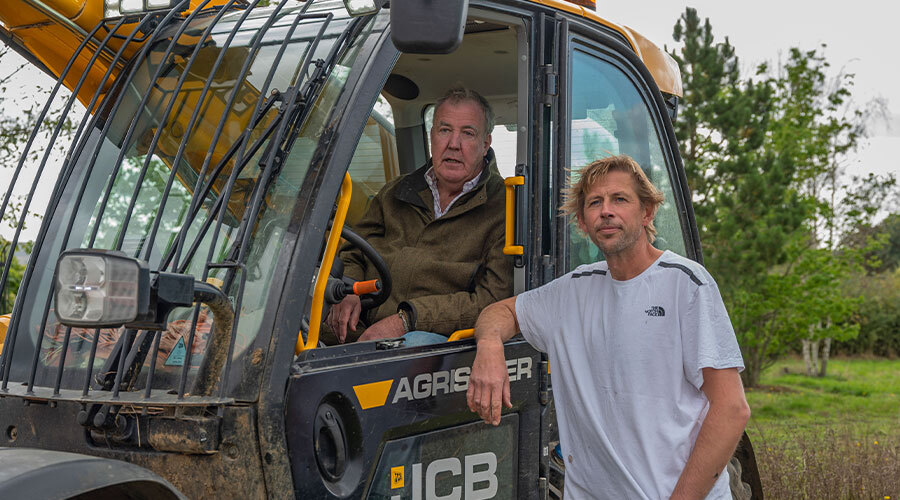
On his way back from a gig over 17 years ago, one half of Groove Armada, Andy Cato, was reading an article about farming and its impact on the environment, and it changed his life.
In fact, the final quote in the article – ‘If you don’t like the system, don’t depend on it’ – inspired him to sell the rights to his Groove Armada songs, in order to invest in a farm in France with the aim of finding more sustainable ways of growing food.
While speaking at Groundswell a couple of years ago, Andy explained that the soil in France is seriously degraded following back-to-back intensive maize growing – something he referred to as a ‘slow catastrophe’.
The impact of climate change, in particular the extreme heatwaves that have been hitting Europe over recent years, have been devastating to the farming landscape, he reveals – commenting that parched ground, wildfires and failed crops are what we have to look forward to, unless agriculture adapts and realises that you have to farm with nature, not against it.
According to Andy, he purchased his farm in the SW of France with “hopeless naivety” – it had only 0.5% organic matter in the soil, and 110ha of the land had been used consistently to grow maize.
The soil was so degraded that even though he was using the soil-friendly techniques he’d learned about – direct drilling with a Claydon drill, mechanical weeding with a Garford inter-row hoe, and so on – nature responded with all the most tenacious weeds; thistles, dock leaves and more.
The situation was untenable, and Andy commented that all he felt was the utter futility of what he was engaged in. But then he came across the book ‘An agricultural testament’ by Sir Albert Howard, which he described as an absolute inspiration – with the key takeaway being that we need to use plants and animals together.
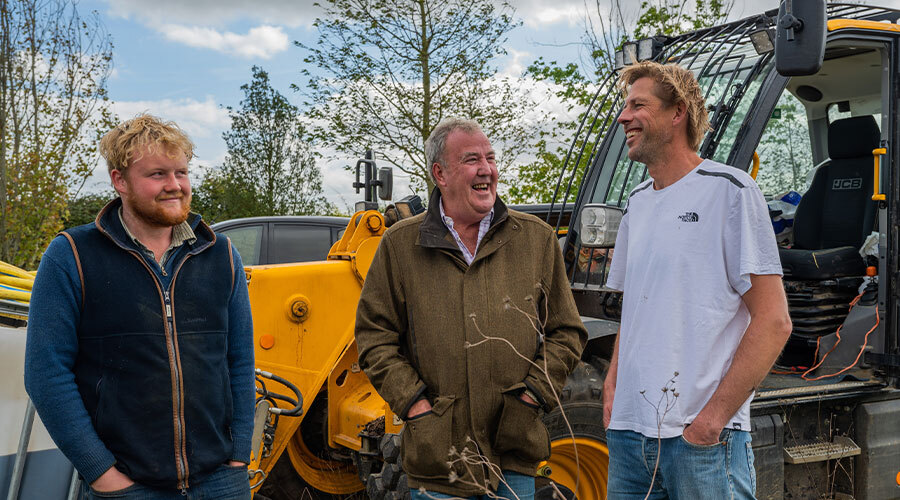
He told his long-suffering wife that he wanted to try to get some cattle, and get some herbal leys down, to try to turn things around.
Andy took on some Red Sussex cattle, as he knew from other farming friends that that breed could survive on a 100% grass-fed diet so would be ideal for grazing. He used a wire corridor system to move the cattle around the different areas of the farm, depending on where they were needed.
Parallel to the mob grazing, he began using an I&J roller, crimper rolling cover crops such as vetch and direct drilling crops into those. He tried the same approach for soya beans which were drilled into rolled rye.
After spending a number of years experimenting with different farming techniques, including more extreme options such as using horse-drawn implements to reduce wheelings, which had varying levels of success, Andy more recently took on a tenancy agreement on a National Trust farm in the UK.
Now, he and his colleagues – TV presenter George Lamb and financial guru Edd Lees who, between them, founded the Wildfarmed concept in 2020 – are on a mission to help farmers move towards soil-focused farming, and make “real food grown in real soil available on the high street at affordable prices”.
Wildfarmed works with a network of farmers across the UK and France, all of whom follow the third-party audited regenerative principles laid out by Wildfarmed.
These are, for all intents and purposes, based around the primary pillars of regenerative agriculture: keeping bare soil covered, integrating livestock into arable systems, avoiding artificial inputs and using IPM to control pest and weed threats.
The primary idea is to create a market which rewards quality rather than quantity (as Andy suggests yield is likely to be around 40% of conventional yield), while finding a way of creating change at the speed and scale that we need to do it.
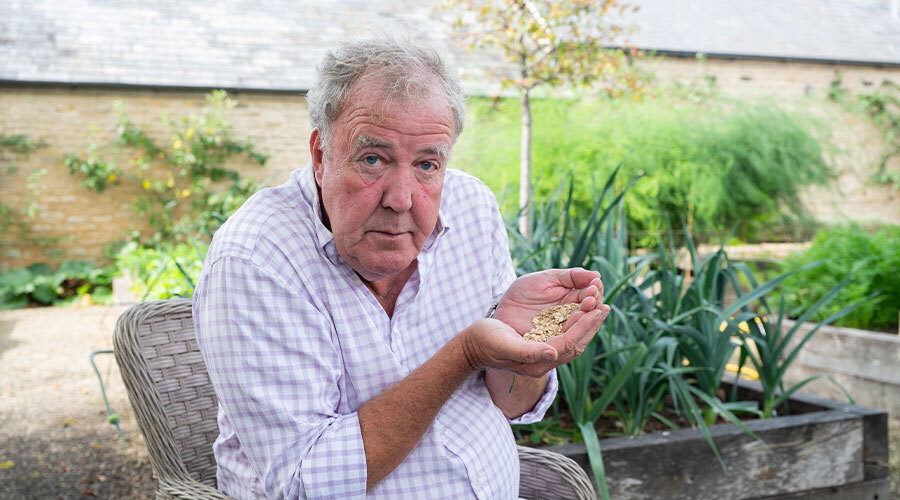
Working with Wildfarmed
John Pawsey of Shimpling Park Farm, just outside Bury St Edmunds, farms around 700ha of his own land, plus another 850ha under farm management contracts – all farmed organically. He has worked with Wildfarmed since 2022, growing around 40ha of Wildfarmed wheat with a clover understory, as well as bi-cropping wheat with beans.
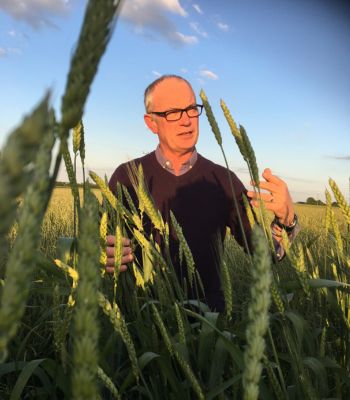
John’s concerns about overworked soils and diminishing biodiversity on the farm led him to convert it to organic in 1999.
He is a leading innovator of research into bi-cropping, and was part of an Innovative Farmers trial researching the use of livestock to manage weeds without chemicals.
Soil type across Shimpling Park Farm is chalky boulder and handslope series clay.
The farm’s rotation is based on a two-year or three-year ley, to suit the 1,000 outdoor-lambing New Zealand Romney sheep on the farm, with four years of cropping after that – a winter crop, followed by a spring crop, then a winter bi-crop, then back to a spring crop.
He grows combinable crops, including heritage wheat, spelt, milling oats, malting barley, lentils, vetches and chia.
According to John, “cultivations are kept to the minimum amount we can get away with while remaining on top of weed issues”.
So how did John get involved with Wildfarmed? “A friend who worked with The National Trust suggested I speak with someone called Andy Cato, who had just taken on a 20-year tenancy at the Trust’s Colleymore Farm,” explains John.
“So, I got in touch, had a chat down at Andy’s farm, and quickly realised that Wildfarmed’s principles were inherently very similar to my own. He is really championing pasture and multi-species cropping and helping conventional farmers wean themselves off pesticides and artificial fertilisers.”
Natural resilience
In terms of wheat varieties grown for Wildfarmed, John uses a blend to try to bring resilience into the field naturally. Although undersowing and bi-cropping alongside the wheat forms part of the Wildfarmed grower guidelines, it’s something that John already has plenty of experience of, having used it for soil health, weed control and livestock grazing for many years.
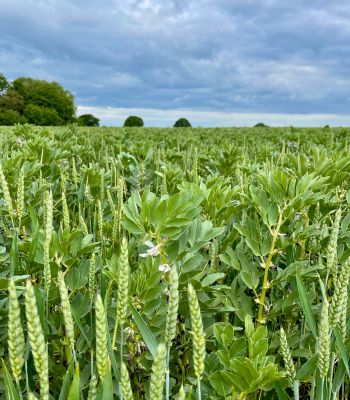
John explains: “Our leys are undersown with something that will be of benefit to our sheeps’ health and fertility, as well as the soil – the mix is clover dominant, including red clover, crimsons clover, Persian clover, birdsfoot trefoil, a bit of timothy – it can be a really diverse mix.
“But when it comes to the wheats, it’s about working out what is needed in that rotation – for example, if you’re growing a tall heritage wheat variety which is highly competitive, you can put in a more aggressive understory like red clover – but if you’re growing a less competitive or shorter variety, I’d choose a crimson clover – but it really depends on what you’re trying to bring to the rotation at that point.”
For John, it’s all about growing in a way that produces a quality crop, while also benefiting the soil, biodiversity and the environment.
Supporting growers
John says what really makes Wildfarmed stand out compared to other organisations trying to do a similar thing, is the support they give to their growers.
“They’re effectively telling their members that they have to go organic, bar using around 80kg of nitrogen, which is a very management-intensive thing to take on,” he explains. “When Shimpling converted to organic over 25 years ago, I made virtually every mistake you possibly could – and it’s taken a lot of time to rectify some of those mistakes.
“But Wildfarmed is supporting growers consistently by holding grower days, hosting an amazing WhatsApp group which is incredibly well populated, and are just really inventive and enthusiastic people who want to make farming work.
“Wildfarmed helps farmers to feel more in control of some of the agronomic decisions that may have been made by other people for them in the past. It’s a steep learning curve, but for people who are really engaged, those who really love their farming and want to do something different, it’s an amazing initiative.”
John is keen to point out that while Andy Cato may be a rock star who’s fairly recently moved into the world of farming, he is absolutely “the real deal”. “He is full of knowledge, passionate about it all, and that rubs off on others. He’s also annoyingly good-looking and talented!” John concludes.
Read more arable news.
